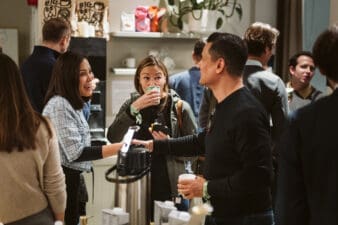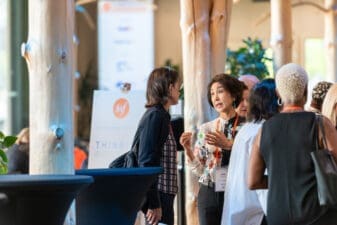Circular economy opportunities in Helsinki: A guide to sustainable growth
Explore the five core business models driving the circular economy, Finland’s strongholds in sustainability, and innovative projects paving the way. Unlock the potential for sustainable growth in the Nordics, with a focus on Helsinki, ESG investing, and the circular economy.

5 min read
Want to learn more about the circular economy in Helsinki?
Our business advisor Sonja Malin can help.
Circular economy opportunities in Helsinki
A circular economy for a sustainable future
The world is waking up to the realization that our growing population and changing climate pose significant challenges due to the scarcity of natural resources. Embracing a circular economy, where resources are reused and regenerated, presents a promising solution to these pressing issues.
Finland’s circular economy leadership and ambitious goals
Finland, a global forerunner in the circular economy, has set ambitious goals to transform its economy into a circular one by 2035. Building upon its success, the country created the world’s first circular economy roadmap in 2016, followed by the City of Helsinki’s own circular economy roadmap in May 2020. These roadmaps have paved the way for sustainable businesses and opened up a plethora of opportunities.
Europe’s vision for a circular economy and Finland’s role
Europe has recognized the immense potential of the circular economy, projecting €1.8 trillion in economic growth by 2030. In Finland, the circular economy is expected to contribute around 3 billion euros to the national economy by the same year. According to McKinsey & Company, adopting circular economy principles and technological advancements could boost Europe’s resource productivity by up to 3% annually.
Five Core Business Models Driving the Circular Economy
The circular economy spans various industries, and five core business models are leading the way:
1. Product as a service
Products are delivered in a service model where the product is owned by the producer and leased to a consumer. In this model, businesses can build long-term relationships with their customers and build higher-quality products managed across the entire lifecycle.
Case: Naava
Naava offers “nature and healthy indoor air as a service.” Their intelligent green walls purify and humidify the air, while the company performs maintenance through their automated system.
2. Renewability
Scarce commodities or “circular supplies” replace scarce commodities with fully renewable, biodegradable, or recyclable resource materials.
Case: Montinutra
Montinutra converts forest industry by-products into ingredients for the cosmetics, food and beverage, and pharmaceutical industries.
3. Sharing platforms
A sharing platform is a peer-to-peer-based model where products or assets with low ownership or use rates are shared. Companies that leverage this model can maximise the use of the products they sell and enhance value creation and productivity. Think Uber, Airbnb, and TaskRabbit.
4. Product life extension
This model aims to extend the lifecycle of a product so that it can remain economically useful. Products or materials that are typically disposed of will instead be maintained or improved through repairing, remanufacturing, upgrading, or remarketing.
Case: Bamomas
Bamomas optimisation service extends the life cycle of industrial batteries by utilising battery data.
5. Resource recovery
This business model takes waste as input material and leverages technology innovations to create valuable products as new outputs.
Case: Honkajokioy
Honkajokioy uses animal-based waste and refines them into raw materials for products such as pet food and biofuels.
Finland’s Strongholds in the Circular Economy Ecosystem
As of 2021, 83% of Finns believe that Finland should take action to promote the circular economy, even if other countries aren’t.
With the citizens and government on its side, Finland has been taking the world by storm when it comes to sustainability: from sustainable steel to recyclable fabrics to micro-plastic-free solutions.
Finland, along with the help of the Finnish Innovation Fund Sitra, even started The World Circular Economy Forum (WCEF). The annual event brings together over 4,000 global business leaders, policymakers, and experts. The goal of the WCEF is to share business opportunities and work towards achieving the UN’s Sustainable Development Goals.
In a study by Deloitte, they found that a large chunk of the circular economy work done in Finland has been focused on construction and urban planning. This is understandable since Finland focused on raising the recycling rate of construction waste to 70% in 2020 (currently 50% has been achieved) to comply with the EU Waste Framework Directive.
Finland has emerged as a leader in sustainability, with strongholds in various sectors:
- Food systems: Resource-efficient processing, nutrient recycling, and value-added products
- Textiles: Proactive design, transparent value chains, and sustainable closed-loop technologies
- Construction: Holistic designs and technologies for longer lifetimes and circular material use
- Metals and minerals: Smart material use and sustainable mineral value chains
- Electronics: Circular designs and waste minimization strategies
- Batteries: Ethical and sustainable battery solutions
- Packaging: Tailored and sustainable closed-loop packaging solutions
Moreover, thanks in part to a deposit system, Finland recycles 95% of cans, 90% of plastic beverage bottles, and 87% of glass bottles. These are some of the best rates in the world; the worldwide recycling rate for cans is only 49.8%.
Growth Opportunities and Challenges in Finland’s Circular Economy
While Finland has many strengths, many things are still lacking in the existing ecosystem, which presents numerous opportunities. Some of those include:
- Increasing the understanding of the primary and secondary raw materials stock and flows in the various regions of the globe would help to create new solutions for a circular economy (EU-wide problem)
- Increased knowledge in the identification of sustainable production and consumption practices at scale, so that current circular economy activities reach their potential. (EU-wide problem)
- Opportunities for specific financing instruments and circular economy investors
- Because the circular economy business is relatively new – there is always room for creating innovative circular economy solutions: optimised waste collection, automated waste sorting stations, and price-competitive cleaning solutions for textile waste.
- Challenges in utilising recycled materials & creating demand.
- The ICT technology needed for a circular economy already exists in Finland — but the data is limited to closed chains. Thus, more openness in utilising the technologies is needed (i.e. open-source data).
Many companies in Finland are starting to take advantage of these opportunities, especially in the plastics and textile industries. Here are a few projects already underway and paving the way for other innovations and companies:
- New Cotton Project: New Cotton Project utilises a textile fibre regeneration technology, which takes textile waste and turns it into a new, man-made cellulosic fibre that looks and feels like cotton. The fibres will be used to create different types of fabrics for Adidas and companies in the H&M Group.
- ExpandFibre – ExpandFibre upgrades pulp fibres, hemicellulose and lignin from renewable and sustainable sources of straw and northern wood into new bioproducts. Its ambition is to meet the growing demands for sustainable textile fibres and other added-value biomaterials.
- Package-Heroes: Package-Heroes studies and develops packaging solutions, that address food protection and the global and constantly increasing concern of plastic packaging waste. Package-Heroes is a research project funded by the Strategic Research Council functioning under the Academy of Finland.
Finland and Helsinki are well on their way to transforming into a circular city. Now is the time for innovative companies to seize the circular economy opportunities that Finland has to offer.
Apply to become one of the Founders to Finland!
Establish your business in Helsinki to access the EU market, join an innovative tech ecosystem in a value-driven society, and enjoy a famously excellent work-life balance. Experience business and life in the capital of the world’s happiest country.
Related articles
Contact Helsinki Partners
If you are interested in learning more about Helsinki and its possibilities – please contact us via the form here. We’ll make sure to get back to you within a few working days.


